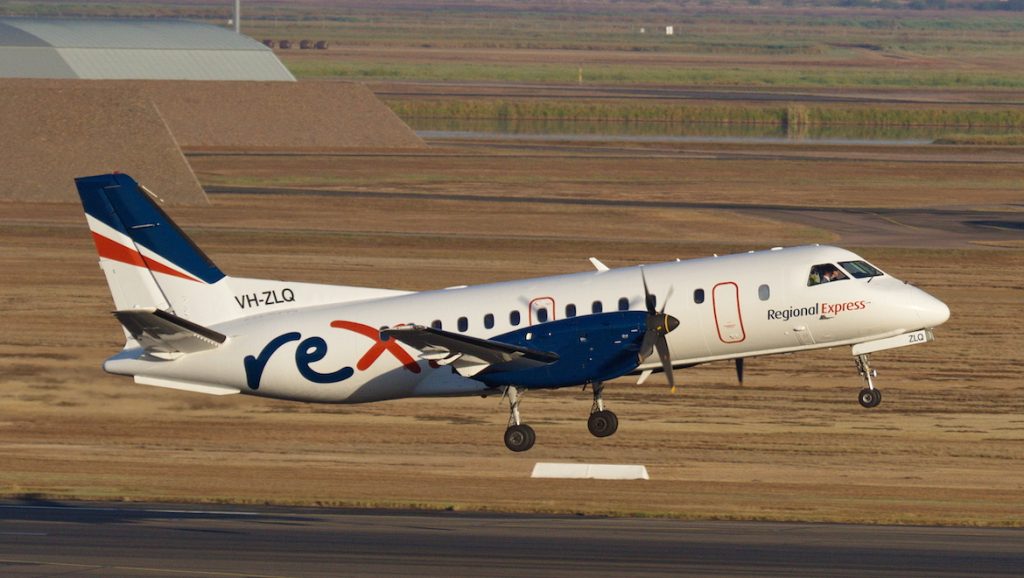
The ACCC has finally rubber-stamped a decision to allow Rex to share revenue and co-ordinate flight schedules with Virgin Australia and Qantas on 10 regional routes.
The new arrangement, which includes flights to Mildura, Dubbo and Wagga, will run until 30 June 2021, however, the regulator noted collaboration is unlikely to occur until government subsidies wind down at the end of the year.
Rex deputy chairman John Sharp said, “Rex has made a commitment to the ACCC not to take advantage of the collaboration to increase prices and Rex has honoured this pledge, not only on the 10 competitive routes, but right across its vast network of almost 60 destinations. Rex’s network-wide average fare today is some 15 per cent lower than the corresponding period last year.”
The decision was first granted an interim authorisation on 23 March but was only given final clearance on 11 September, and applies to the following routes:
NSW
- Sydney – Wagga (Rex and Qantas)
- Sydney – Dubbo (Rex and Qantas)
- Sydney – Albury (Rex, Qantas and Virgin Australia, noting Virgin Australia has suspended services on this route)
- Sydney – Armidale (Rex and Qantas, noting Rex has suspended services on this route)
Victoria
- Melbourne – Mildura (Rex, Qantas and Virgin Australia, noting Virgin Australia has suspended services on this route)
SA
- Adelaide – Port Lincoln (Rex and Qantas)
- Adelaide – Whyalla (Rex and Qantas)
- Adelaide – Kangaroo Island (Rex and Qantas, Rex had announced an exit from this route in July 2020, but is currently still servicing it)
Queensland
- Cairns –Townsville (Rex and Qantas)
- Townville – Mount Isa (Rex and Qantas).
As part of the deal, airlines must not set a fare higher than the equivalent charged on 1 February and Rex has been instructed to provide monthly updates.
“Once the funding arrangements are removed, the ACCC considers that the ability for the airlines to co-ordinate and share revenue is likely to result in public benefits by supporting the continuity of air services to certain regions during the COVID-19 pandemic and enabling better schedule spread, which provides greater choice for passengers flying to and from those regional destinations,” concluded the ruling.
Rex used the announcement to take a swipe at Qantas, noting, “Rex has not managed to establish any collaboration with QantasLink, however, we will not cease to persevere to look for efficiencies so that rural and remote regional communities will continue to benefit from the essential air links that Rex brings to all states in Australia.”
The two airlines have been at loggerheads over Qantas’ “predatory” move into flying to Orange, and the regional airline’s decision to launch domestic flights between Sydney-Brisbane-Melbourne.
However, the airlines are likely to face increasing scrutiny when networks begin to be re-established as borders open and movement restrictions lift.
In June, Australian Aviation reported how Treasurer Josh Frydenburg instructed the ACCC to monitor whether airlines reintroduce capacity too quickly purely to damage rivals.
The commission will now look for “early signs of damage” or moves that could “damage a competitor or drive them off route”.
The news means the Australian Competition and Consumer Competition now has a specific remit to investigate the issue, and will be required to submit quarterly reports to the government.
















AgentGerko
says:The important part of this announcement is –
“As part of the deal, airlines must not set a fare higher than the equivalent charged on 1 February”
Taking Sydney – Dubbo as an example, as of 1st Feb 2020 Rex had a cheapest oneway fare of $179.69 for L class, however they also had a maximum oneway fare of $588.89 for Y class, a fare nobody would ever buy.
This means so long as neither QF or ZL charge a fare of higher than $588.89 they are complying with the rules. They can however remove or increase any or all of the fares lower than this. They could effectively only offer a single fare of $588.89, considerably more than most would ever consider paying, quite legally within the rules.
The new rule should read “Airlines must maintain fare levels equal to all those levels available as of 1st Feb and provide equal seat availability for each fare level as was available on 1st Feb.
Mike
says:Thanks for the article. I just wanted to point out the term “rubber stamp” means to approve automatically without proper consideration. Probably not the correct usage in the first sentence.
Adam Thorn
says:The agreement itself has been in effect since March and was always strongly supported by the ACCC. I think the decision was mostly a formality. Less is more in writing, particularly for intros, and phrases such as ‘rubber-stamp’ help consolidate longer thoughts succinctly that can be fleshed out and explained later on, as was the case here.
Thanks for your comment,
Adam
Rambo Freeman
says:A 3 way split, hahaha, that will never work with a leprechaun in the crowd. What a joke . Odds are it might last 8 months.